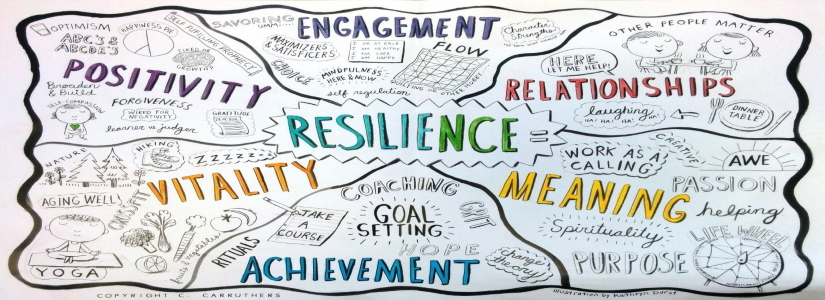Over the past several months everyone has been tested to their limits with the global Covid-19 pandemic and many have experienced adversity and even trauma as a result of this unprecedented time in our history. When we, as individuals, experience difficulties & hardship, the capacity to recover quickly, change course, emotionally heal, and move forward, is called Resilience. In other words, resilience is the capacity to anticipate, adapt and recover. A process that allows individuals who are highly resilient to get knocked down, but still be able to get up again, and even move through the challenge and grow from it.
Resilience is less about individual personality traits or genetics and more about behaviours, thoughts and actions. Resilience can be learned, developed and practiced. Researchers suggest some of the following will increase a person’s resilience in times of difficulty; building relationships, fostering wellness, finding purpose, embracing healthy thoughts, and seeking help. Taking control of what you can control in your life and giving yourself grace where you cannot.
At Calgary Alternative Support Services we see the value in celebrating diversity, shared experiences, feelings of belonging, and connection. This is what we often refer to as our CASS community. Communities like ours, that embrace diversity, may in fact be better able to face adversity. By embracing the diversity, the community is based on relationships of mutual concern and benefit, and therefore, better able to establish consensus and collaboration.
While factors that build resilience are often spoken of on the individual level, community resilience can be a contributing factor to greater individual resilience as well. Community resilience refers to the ability to take meaningful, deliberate and collective action; interacting as a collective unit, for the collective good. Community provides individuals with a sense of belonging, shared experiences and values, and close relationships. When an individual feels a sense of belonging in a community – strengthened even more so by their needs being fulfilled through affiliation with that community – the sense of belonging acts as a protective factor. The collective traits of the community have positive impacts on the individuals as well. Mood boosting traits such as, optimism, ability to regulate emotions, and positive attitude, can contribute to the overall mood and can be infectious to the individual members of the community. We need our communities; in whatever shape and form they may come in.
Resilience is not unique to the current situation we are all experiencing through the Covid-19 pandemic. Hardships and trauma are a real part of life. Resilience does not mean denying that unpleasant stressors exist or that a person will not experience difficulty or distress. Instead, it is about accepting the emotions that arise, being curious about why, and practicing self-compassion. We see resilient people everywhere we go. We know so many of the individuals within the CASS community are very resilient people. We see you. And we look forward to exploring all of the facets of resilience as they relate to CASS from clients, to staff, to programs and even our infrastructure and business operations.
And so we want to celebrate the resilience we see at CASS, by sharing stories of resilience within our CASS community over the next several months. Watch for the hashtag #resilienttogether across our social media platforms. If you have any great examples of resilience, share them to coms@c-a-s-s.org. We are more resilient, together!
References
Psychology Today (Retrieved 2020). Resilience. Retrieved from https://www.psychologytoday.com/ca/basics/resilience
American Psychological Association (2012). Building your Resilience. Retrieved from https://www.apa.org/topics/resilience
Haas, E.N. (2007). Handbook of Injury and Violence Prevention; Chapter 19 Building Resilience to Mass Trauma Events. Atlanta, GA: Centre for Disease Control and Prevention.

